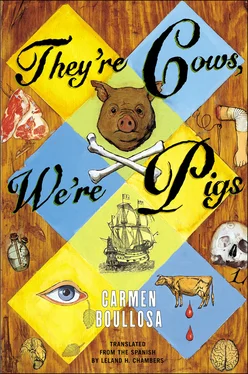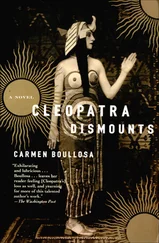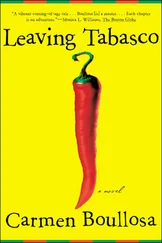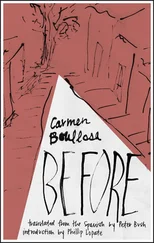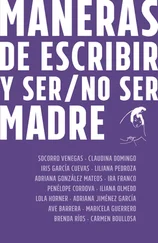Carmen Boullosa - They're Cows, We're Pigs
Здесь есть возможность читать онлайн «Carmen Boullosa - They're Cows, We're Pigs» весь текст электронной книги совершенно бесплатно (целиком полную версию без сокращений). В некоторых случаях можно слушать аудио, скачать через торрент в формате fb2 и присутствует краткое содержание. Год выпуска: 2001, Издательство: Grove Press, Жанр: Современная проза, на английском языке. Описание произведения, (предисловие) а так же отзывы посетителей доступны на портале библиотеки ЛибКат.
- Название:They're Cows, We're Pigs
- Автор:
- Издательство:Grove Press
- Жанр:
- Год:2001
- ISBN:нет данных
- Рейтинг книги:4 / 5. Голосов: 1
-
Избранное:Добавить в избранное
- Отзывы:
-
Ваша оценка:
- 80
- 1
- 2
- 3
- 4
- 5
They're Cows, We're Pigs: краткое содержание, описание и аннотация
Предлагаем к чтению аннотацию, описание, краткое содержание или предисловие (зависит от того, что написал сам автор книги «They're Cows, We're Pigs»). Если вы не нашли необходимую информацию о книге — напишите в комментариях, мы постараемся отыскать её.
acclaimed Mexican novelist Carmen Boullosa animates this world of bloody chaos and uncertain possibility through the eyes of the young Jean Smeeks, kidnapped in Flanders at age thirteen and sold into indentured servitude on Tortuga, the mythical Treasure Island. Trained in the magic of medicine by le Negre Miel, an African slave healer, and Pineau, a French-born surgeon, Smeeks signs on as a medical officer with the pirate band the Brethren of the Coast. Transformed by the looting and violence of pirate life, Smeeks finds himself both healer and despoiler, servant and mercenary, suspended between the worlds of the law-abiding, tradition-bound "cows" and the freely roaming and raiding "pigs."
They're Cows, We're Pigs — читать онлайн бесплатно полную книгу (весь текст) целиком
Ниже представлен текст книги, разбитый по страницам. Система сохранения места последней прочитанной страницы, позволяет с удобством читать онлайн бесплатно книгу «They're Cows, We're Pigs», без необходимости каждый раз заново искать на чём Вы остановились. Поставьте закладку, и сможете в любой момент перейти на страницу, на которой закончили чтение.
Интервал:
Закладка:
I wish to yield the right to speak to this man, to le Nègre Miel, just as I heard him tell his story more than once as he was healing my back injured by the beatings, furtively giving me extra portions of food, smoked meat, cassava bread, fruits, and plants that he was familiar with on Tortuga (to which, perhaps, I owe my unusual height), or restoring my wasted limbs with concoctions he brewed and administered, and that he taught me how to prepare and prescribe, during time snatched from my labors, behind my master’s back, with the help of my clever lies:
lE nÈGRE mIEL’S taLE
I was born where the earth reaches its perfection. The climate is perfect: neither heat nor cold offers any reason to cover the body because the air itself clothes the skin exquisitely. There are wonders and an abundance of fruits, and the plants without exception are edible from flower to root, seeds, stems, leaves, branches and all. Water runs everywhere in cool branches, like that here in Tortuga which flows ceaselessly inside the fort, crossing the land here and there, so that no one ever suffers thirst and the earth is always covered with green. Zebras, lions, giraffes, elephants, antelopes: these are some of the wondrous animals, as varied as the fruits of the land, that populate the perfect valley in which I was born. Since I was very little, my father, my mother, and their brothers would teach me the secrets of nature, which spirits are hidden in which forms, and how to invoke them in order to cure diseases, heal wounds, make sadness depart. I also learned French, and even how to write it, because my mother’s brother lived in a French city for several years. When it was time to cease being a child, I was initiated into virility. Then I learned greater secrets. A new initiation, which we called “Entering the World,” took place when I was eighteen. In it, they sewed to my chest, transversally, from my left shoulder to the ribs on my right, the sash of leather and fabric that identifies those of us who come from that place where nature reaches its perfection; the rite being concluded, I left my own land, in the belief that I would return, as all my people had done before me, and without imagining that I would be plucked out of my beloved valley forever. That is why le Nègre Miel no longer sees. He prefers his sight to concern itself with memories, with what his eyes would not see were they to be opened. That is why le Nègre Miel always uses French when he speaks out loud. We should preserve by our silence the languages that our parents taught us, so they do not become wasted, so that in silence they can take pains deep within us to keep our spirits focused on high, and thus the gods will not ignore us and instead will protect us. The first village I served got into a bloody struggle with another village nearby. I will not give an account of the battles, to which my blood is so opposed, my time being spent healing wounds, curing the sick, strengthening people’s broken health; thinking, when I was alone, that when seventy full moons had come and gone I would return to my own people, to the valley where all is perfection, to teach the children what had been taught to me plus what I had learned during the seventy moons, and to start a new line of descendants with someone of my own blood.
The conflict grew worse and the people of the village where I lodged were vanquished; together with the other young men, notwithstanding my lineage, I was taken prisoner in token of the defeat. I thought I would quickly find myself free, distinguished as I was by the sash that crossed my chest, in which everyone knew that I kept remedies useful for all. What I never imagined was that I would fall into the hands of the English, sold like the rest of us by the victorious village that acted as if I were one of the barbarians. Buried in the hold of a ship to make the voyage, I discovered I was going to places whose existence I had never suspected, without any of us in that cesspool being able to see where we were being taken, like merchandise, fastened with chains at the neck, the ankles, the wrists; roasting us, as we begged for cool air or at least for an end to the rocking back and forth. The ship we were traveling on was taken by French pirates and they quickly set sail for the Antilles. Such attacks on slave ships are not uncommon, but among these freebooters it was not customary and even inspired repugnance; but now needing resources to get ready for an ambitious enterprise in the Caribbean, they kept both ships, which was most unusual for them, the one in which they were sailing plus the one they had boarded, and set out immediately for the sale of their lucrative though disgusting booty.
When they came down below to take a look at us and I heard them speak amongst themselves, I made sure my correct French was noticed, but the only thing I obtained was a cold look at my chains, though not at my body; the one who vouchsafed this confirming only that the blacks were well secured and making his whip sound very close, almost touching me and actually hurting the one who was right next to me even though he was not connected to the same chain, an old man who spent all his time weeping, crying out his misfortune aloud, weeping for his sons and grandsons and complaining that his age had not been respected; and with good reason, since later, when on the open sea they brought us up on deck to choose and put a price on us, him they threw overboard thinking it unreasonable to waste food on him as being so old that no one would pay much for him, first cutting off his hands, his feet, and his head, in that order, to avoid having to remake the chain that linked him together with six others or else having to return his flesh to the hold to rot.
When it came my turn to go up on deck, I had a stroke of luck that was worth my life on Tortuga. They brought us up seven at a time because that was how many my chain joined together at the neck, wrists, and ankles; and all of us blinded by the sun that never came into the hold where they kept us entombed, into which a little light filtered only when they pulled back the hatch to lower our food and let in those who were to pour it into the feeding troughs. With the English it would be five men armed to the teeth (they being cowards, since we were fastened down so harmlessly, like nails in a wall) who amused themselves sometimes by leaving it out of anyone’s reach; and now it was a single Frenchman who with cold patience arranged the food near our faces in the wooden troughs, we eating more like cattle than persons, being unable to use our chained hands to bring the food up to our mouths. I recovered from the dazzling sunlight sooner than the other six, or at least one of them, because I was able to see when we fell as one of us stumbled, still blinded by the sunlight, and we being joined by the same chain, all seven of us tumbled to the deck. Before my eyes was a leather boot, cut open at the toe with a knife so as not to irritate a wound that did not wish to heal, and I knew immediately that this was not a wound caused by a weapon or a knife but a vein that was sick, that had burst below the skin, and so I said as much, out loud and in French while facedown on the deck, adding that I knew how to cure it with the remedies in the pouches of the sash on my chest. The man with the boot, second in command of the expedition and commander of the slave ship, because the Captain was in the pirates’ ship, gave the order for them to release me from the chain of seven to which I was soldered, and ordered the blacksmith brought over from the other ship to get me free. Noticing that there was a delay, I said it was not necessary to free me in order to cure him because healing wounds, causing illnesses to go away, and curing melancholy was in my blood and that if His Excellency the one with the opened boot would permit all seven of us to draw near him, I being unable to move without the other six, I would begin to cure him immediately and with great pleasure. He gave the order for us to approach. All seven of us sank down to examine the wound. Some of them were squeezed closer than the others for the chain to permit my hands to take from my sash a powder of dried herbs that removes pain if rubbed over the wound while being blown on with a warm breath. Again all seven of us bent down before his boot, and even farther down, with our heads almost on the deck so I could apply the powder. Then we stood up to allow cool air to reach the empowdered wound and I asked for honey, or sugar if they had no honey. There was some honey aboard the other ship. It arrived together with the blacksmith, packed in a huge barrel because I had not said that I needed only a little of it. Even before they began to strike at the chain in order to free me, I applied some honey to the wound (which, from that moment, because of the deceptive powder, already showed some relief) and repeated the application on succeeding days, until with the passing of seven of them it closed over completely. Now without the chain about my neck, I put my hand to the remedies I had brought with me, relieving one man from a hopeless migraine, getting rid of bothersome lice on those who allowed a seed from my country to be placed in their right ears, and aches and pains of all kinds from all who suffered from them; remedies that brought me some prestige, so that when we reached Cuba to exchange the contraband slaves for powder and arms from the Spaniard with whom they had already arranged the business, I had already been admitted into the Society of the Brethren of the Coast, swearing fidelity to them, abandoning the name given me by my parents for that of le Nègre Miel, and checking over the contract they gave me to sign and on which I printed my new name with a clear hand, to the great surprise and rejoicing of the other Brothers, who had not believed it possible for a black man to be able to read and write. Because of this, and also for knowing how to cure, I did not come into the Society as a matelot, or sailor, nor did I need a master or anyone whose clothes I would have to wash, make his meals, clean his hut, cultivate his garden, or remain by his side during combat and protect him for two years like any other aspirant for registration on Tortuga; although what is certainly true is that they made my membership in the Society conditional on the approval of the Council of Older Pirates, before whom, upon my arrival, I swore my loyalty before the cross and on a Bible, as if I were both a Catholic and a Protestant at once, and I wrote the sentence they dictated so it could be seen that my hand was skilled in lettering. When we arrived at Tortuga, while everyone else was preparing for the expedition, I wandered around over a large part of the island and even went over by canoe to La Grande Terre on Hispaniola looking for materials to replenish my remedies, of which I found more than I expected, rejoicing me in the extreme, but I felt that the spirits on Tortuga were so powerful that I obtained a dog to go with me and warn and protect me by being close by, and in that way I was able to conquer my fear.
Читать дальшеИнтервал:
Закладка:
Похожие книги на «They're Cows, We're Pigs»
Представляем Вашему вниманию похожие книги на «They're Cows, We're Pigs» списком для выбора. Мы отобрали схожую по названию и смыслу литературу в надежде предоставить читателям больше вариантов отыскать новые, интересные, ещё непрочитанные произведения.
Обсуждение, отзывы о книге «They're Cows, We're Pigs» и просто собственные мнения читателей. Оставьте ваши комментарии, напишите, что Вы думаете о произведении, его смысле или главных героях. Укажите что конкретно понравилось, а что нет, и почему Вы так считаете.
